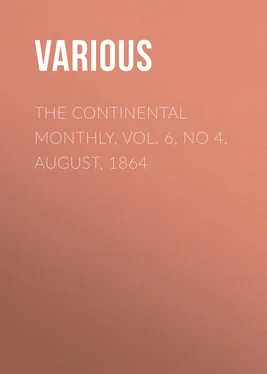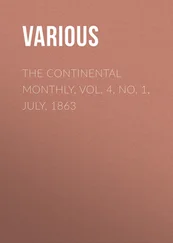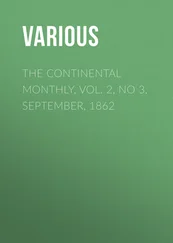Various - The Continental Monthly, Vol. 6, No 4, August, 1864
Здесь есть возможность читать онлайн «Various - The Continental Monthly, Vol. 6, No 4, August, 1864» — ознакомительный отрывок электронной книги совершенно бесплатно, а после прочтения отрывка купить полную версию. В некоторых случаях можно слушать аудио, скачать через торрент в формате fb2 и присутствует краткое содержание. Жанр: foreign_antique, periodic, Языкознание, Политика, foreign_edu, на английском языке. Описание произведения, (предисловие) а так же отзывы посетителей доступны на портале библиотеки ЛибКат.
- Название:The Continental Monthly, Vol. 6, No 4, August, 1864
- Автор:
- Жанр:
- Год:неизвестен
- ISBN:нет данных
- Рейтинг книги:4 / 5. Голосов: 1
-
Избранное:Добавить в избранное
- Отзывы:
-
Ваша оценка:
- 80
- 1
- 2
- 3
- 4
- 5
The Continental Monthly, Vol. 6, No 4, August, 1864: краткое содержание, описание и аннотация
Предлагаем к чтению аннотацию, описание, краткое содержание или предисловие (зависит от того, что написал сам автор книги «The Continental Monthly, Vol. 6, No 4, August, 1864»). Если вы не нашли необходимую информацию о книге — напишите в комментариях, мы постараемся отыскать её.
The Continental Monthly, Vol. 6, No 4, August, 1864 — читать онлайн ознакомительный отрывок
Ниже представлен текст книги, разбитый по страницам. Система сохранения места последней прочитанной страницы, позволяет с удобством читать онлайн бесплатно книгу «The Continental Monthly, Vol. 6, No 4, August, 1864», без необходимости каждый раз заново искать на чём Вы остановились. Поставьте закладку, и сможете в любой момент перейти на страницу, на которой закончили чтение.
Интервал:
Закладка:
The two chambers met February 26, 1849. After a session of two months, during which the lower chamber showed a disposition to modify the constitution more than was agreeable to the king, the upper chamber was ordered to adjourn, the lower was dissolved, and a new election ordered. The new Parliament met August 7. The revision was completed on the last of January, 1850. On the 6th of February, the king, in the presence of his ministers and of both chambers, swore to observe the constitution. Before doing so, he made an address, in which he explained his position, alluding in a regretful strain to the scenes of violence in the midst of which the constitution had been drawn up, expressing his gratitude to the chambers for their assistance in perfecting the hastily executed work, calling upon them to stand by him in opposition to all who might be disposed to make the liberty granted by the king a screen for hiding their wicked designs against the king, and declaring: 'In Prussia, the king must rule; and I do not rule because it is a pleasure, God knows, but because it is God's ordinance; therefore, I will reign . A free people under a free king—that was my watchword ten years ago; it is the same to-day, and shall be the same as long as I live.' The ministers and the members of the two chambers, after the king had sworn to support the constitution, took the same oath, and in addition one of loyalty to the king. The new government was inaugurated. Prussia had become a limited monarchy.
It is at this point appropriate to take a general view of the Prussian constitution itself. It has been variously amended since 1850, but not changed in any essential features; without dwelling on these amendments, therefore, we consider it as it now stands.
As to the king: he is, as such, wholly irresponsible. He cannot be called to account for any act which he does in his capacity as monarch. But his ministers may be impeached. They have to assume and bear the responsibility of all royal acts. None of these acts are valid unless signed by one or more of the ministers. To the king is intrusted all executive power; the command of the army; the unconditioned right of appointing and dismissing his ministers, of declaring war and concluding peace, of conferring honors and titles, of convoking the national diet, closing its sessions, proroguing and dissolving it. He must , however, annually call the Houses together between November 1 and the middle of January, and cannot adjourn them for a longer period than thirty days, nor more than once during a session, except with their own consent. Without the assent of the diet he cannot make treaties with foreign countries nor rule over foreign territory. He has no independent legislative power, except so far as this is implied in his right to provide for the execution of the laws, and, when the diet is not in session, in case the preservation of the public safety or any uncommon exigency urgently demands immediate action. All such acts, however, must, at the next session of the Houses, be laid before them for approval.
The ministry consists of nine members, under the presidency of the minister of foreign affairs; besides him are the ministers of finance, of war, of justice, of worship (religious, educational, and medicinal affairs), of the interior (police and statistical affairs), of trade and public works (post office, railroad affairs, etc.), of agricultural affairs, and of the royal house (matters relating to the private property of the royal family). The supervision exercised by the ministry over the various interests of the land is much more immediate and general than that of the President's cabinet in the United States. Now, however, their authority in these matters is of course conditioned by the constitution and the laws. The ministers are allowed to enter either House at pleasure, and must always be heard when they wish to speak. On the other hand, either House can demand the presence of the ministers.
The legislative power is vested in the king and the two Houses of Parliament. The consent of all is necessary to the passing of every law. These Houses (at first called First and Second Chambers, now House of Lords and House of Delegates— Herrenhaus and Abgeordnetenhaus ) must both be convoked or prorogued at the same time. In general a law may be first proposed by the king or by either of the Houses. But financial laws must first be discussed by the House of Delegates; and the budget, as it comes from the lower to the upper House, cannot be amended by the latter, but must be adopted or rejected as a whole.
The House of Lords is made up of various classes of persons, all originally designated by the king, though in the case of some the office is hereditary. They represent the nobility, the cities, the wealth, and the learning of the land. Each of the five universities furnishes a member. The king has the right to honor any one at pleasure, as a reward for distinguished services, with a seat in this body. Of course, as the members hold office for life, and hold their office by the royal favor, it may generally be expected to be a tolerably conservative body, and to vote in accordance with the wishes of the king.
The House of Delegates consists of three hundred and fifty-two members, elected by the people, but not directly. They are chosen, like our Presidents, by electors, who are directly chosen by the people. Two hundred and fifty inhabitants are entitled to one elector. Every man from the age of twenty-five is allowed to vote unless prohibited for specific reasons. But strict equality in the right of suffrage is not granted. The voters of each district are divided into three classes, the first of which is made up of so many of the largest taxpayers as together pay a third of the taxes; the second, of so many of the next richest as pay another third; the last class, of the remainder. Each of these divisions votes separately, and each elects a third part of the electors. The House of Delegates is chosen once in three years, unless in the mean time the king dissolves it, in which case a new election must take place at once.
As to the rights of Prussians in general, the constitution provides that all in the eye of the law are equal. The old distinctions of classes still exists: there are still nobles, with the titles prince, count, and baron; but the special privileges which they formerly enjoyed are not secured to them by the constitution. The king can honor any one with the rank of nobility; but the name is the most that can be conferred. In most cases the right of primogeniture does not prevail, so that the aristocracy of Prussia is of much less consequence than that of England. The poverty which so often results from the division of the estates of nobles has led to the establishment of numerous so-called Fräuleinstifter —charitable foundations for such a support of poor female members of noble families as becomes their rank. Many of these institutions were formerly nunneries. It is further provided by the constitution that public offices shall be open to all; that personal freedom and the inviolability of private property and dwellings shall be secured; that all shall enjoy the right of petition, perfect freedom of speech, the liberty of forming organizations for the accomplishment of any legal object; that a censorship of the press can in no case be exercised, and that no limitation of the freedom of the press can be introduced except by due process of law; that civil and political rights shall not be affected by religious belief, and that the right of filling ecclesiastical offices shall not belong to the state. Only 'in case of war or insurrection, and of consequent imminent danger,' has the Government a right to infringe on the above specified immunities of the citizens and the press.
The foregoing is all that need be given in order to convey a general idea of what the Prussian constitution is. It is in its provisions so specific and clear, that one would hardly expect that disputes respecting its meaning could have reached the height of bitterness which has characterized discussions of its most fundamental principles. The explanation of this fact is to be sought in the mode of the introduction of the constitution itself. The English constitution has been the growth of centuries; the Prussian, of a day. The latter, moreover, was not, like ours, the fundamental law of a new nation, but a constitution designed to introduce a radical change in the form of a government which, during many centuries, had been acquiring a fixed character. It undertook to remodel at one stroke the whole political system. Not indeed as though there had been no sort of preparation for this change. The general advance in national culture, the general anticipation of the change, as well as the actual approaches toward it in the administrative measures of Frederick the Great and Frederick William III., paved the way for the introduction of a popular element in the Government. Nevertheless, the actual, formal introduction itself was sudden. The constitution was not, in the specific form which it took, the result of experience and experiment. And, as all history shows, attempts to fix or reconstruct social systems on merely theoretical principles are liable to fail, because they cannot foresee and provide for all the contingencies which may interfere with the application of the theories. Moreover, in the case of Prussia, as not in that of the United States, the constitution was not made by the people for themselves, but given to them by a power standing over against them. There was, therefore, not only a possibility, as in any case there might be, that the instrument could be variously interpreted on account of the different modes of thinking and difference of personal interests, which always affect men's opinions; but there was here almost a certainty that this would be the case on account of the gulf of separation which, in spite of all the bridges which often are built over it, divides a monarch, especially an absolute, hereditary monarch, from his subjects. In the case before us, it is certain that the king conceded more than he wished to concede, and that the people received less than they wished to receive. That they should agree in their understanding of the constitution is therefore not at all to be expected. The most that the well wishers of the land could have hoped was that the misunderstandings would not be radical, and that in the way of practical experience the defects of the constitution might be detected and remedied, and the mutual relations of the rulers and the ruled become mutually understood and peacefully acquiesced in.
Читать дальшеИнтервал:
Закладка:
Похожие книги на «The Continental Monthly, Vol. 6, No 4, August, 1864»
Представляем Вашему вниманию похожие книги на «The Continental Monthly, Vol. 6, No 4, August, 1864» списком для выбора. Мы отобрали схожую по названию и смыслу литературу в надежде предоставить читателям больше вариантов отыскать новые, интересные, ещё непрочитанные произведения.
Обсуждение, отзывы о книге «The Continental Monthly, Vol. 6, No 4, August, 1864» и просто собственные мнения читателей. Оставьте ваши комментарии, напишите, что Вы думаете о произведении, его смысле или главных героях. Укажите что конкретно понравилось, а что нет, и почему Вы так считаете.












